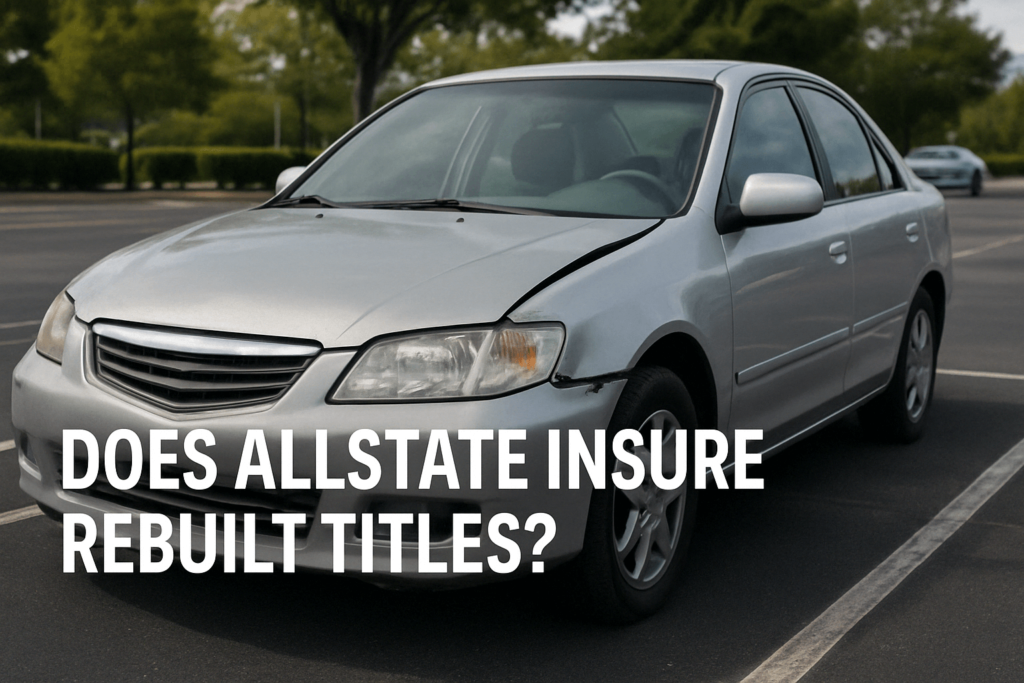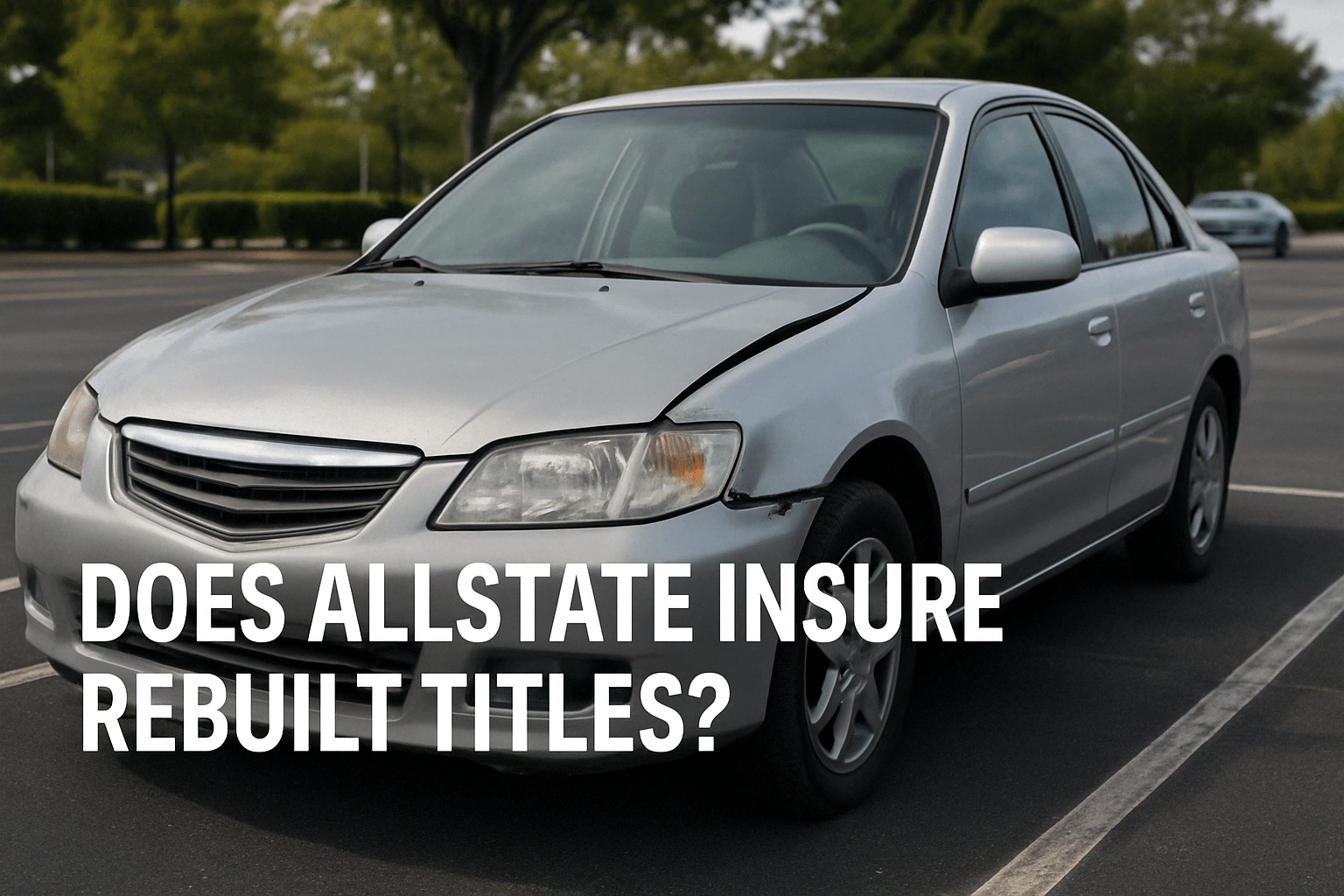
Does Allstate Insure Rebuilt Titles? Yes—But With Strings Attached
In the realm of car ownership, few choices spark more questions than purchasing a rebuilt title vehicle. The price tag may be appealing, but the paperwork that follows? Far less glamorous. Among the most frequently asked questions: Does Allstate insure rebuilt titles? The short answer is yes—but the full answer requires a closer look at how modern insurers assess risk, repair, and reward.
Rebuilt titles, once considered red flags, are now finding their place in mainstream insurance—though cautiously. These vehicles, often salvaged and restored after severe damage, pass inspections to become roadworthy again. But for many major insurance carriers, including Allstate, this status comes with conditions—some clearly stated, others buried in policy fine print.
| Coverage Aspect | Allstate’s Approach |
|---|---|
| Insures rebuilt titles? | Yes, Allstate does insure vehicles with rebuilt titles. |
| Type of coverage offered | Primarily liability-only. Full coverage is rarely available, unless specific conditions are met. |
| Factors influencing approval | Vehicle condition, repair records, inspection history, and sometimes your geographic location. |
| Competitor flexibility | Geico and State Farm are known to offer broader full-coverage options for rebuilt titles. |
| Application process | Must contact a local Allstate agent. Policy approval often depends on internal underwriting discretion. |
⚙️ Why Allstate Says “Yes” to Rebuilt Titles—Cautiously
Allstate is far from alone in its hesitancy. By integrating underwriting data and historical repair metrics, most insurers attempt to assess risk beyond the metal and paint. Vehicles with rebuilt titles have, at some point, been declared total losses. Even with professional repairs, the risk of electrical faults, alignment issues, or hidden frame damage remains exceptionally high.
As a result, Allstate typically restricts coverage to liability only—the bare minimum required by state laws. This means if your rebuilt-title car is vandalized or totaled again, you may be on the hook for the loss. Full coverage may be offered in rare cases, but such approvals are notably uncommon and must pass through multiple underwriting layers.
🧠 Real-World Insight: Why Coverage Still Matters
Take the case of Marcus Lin, a 35-year-old software technician from Denver. After purchasing a rebuilt 2017 Honda Accord for $6,800, he assumed he’d secure full coverage—until Allstate declined anything beyond liability. “They were polite, but firm,” he recalls. “I ended up using Geico instead. Slightly more expensive, but they gave me comprehensive with a $500 deductible.”
His experience is strikingly similar to hundreds of other rebuilt-title owners who find out late that their coverage options are limited—or non-existent—depending on the provider.
📈 Comparing Allstate to Its Competitors
In the current insurance landscape, State Farm and Geico are considered particularly innovative when it comes to rebuilt title flexibility. These carriers are notably more open to offering full coverage, especially when detailed repair records and high-resolution vehicle images are submitted upfront.
Progressive also writes policies for rebuilt titles, though their offers vary significantly by state. Allstate, on the other hand, maintains a more conservative posture—providing reliable service but limited protection.
💬 What You Should Do Before Calling an Agent
- Gather inspection documents and proof of repairs
- Know your VIN history—be ready to explain the rebuild
- Check your state’s minimum insurance requirements
- Compare multiple quotes before signing
By proactively preparing these materials, you’ll streamline the approval process—and improve your chances of obtaining at least a liability policy with Allstate or another top-tier insurer.
🗣️ Final Word: A Cautious “Yes” That Still Deserves Your Attention
In the context of affordability and second-chance vehicles, rebuilt title cars can offer remarkable value—but only if insured properly. Allstate’s willingness to insure these vehicles, albeit with limitations, reflects a cautious optimism rather than a blanket rejection.
By approaching the process informed, organized, and patient, you transform a potentially frustrating insurance experience into one that’s remarkably effective and financially protective. Whether you stick with Allstate or shop around, understanding what rebuilt title insurance entails is the key to making a confident, future-forward choice.
🧠 Frequently Asked Questions
About Allstate and Rebuilt Title Insurance Coverage
1. Does Allstate insure vehicles with rebuilt titles?
Yes, Allstate does insure vehicles with rebuilt titles. However, coverage is typically limited to liability-only policies, meaning damage to your own vehicle may not be covered in the event of a crash, theft, or weather-related event.
2. Will Allstate provide full coverage for a rebuilt title vehicle?
In most cases, no. Allstate rarely offers full coverage on rebuilt titles, as these vehicles carry increased risk due to their previous salvage history. Some exceptions may exist based on the vehicle’s repair quality and your location, but they’re uncommon.
3. Why do insurance companies hesitate to fully cover rebuilt title cars?
Rebuilt title cars were previously declared total losses. Despite repairs and inspections, hidden damage or reduced structural integrity remains a concern. As a result, insurers like Allstate offer only limited policies to manage risk.
4. What kind of insurance can I expect from Allstate for a rebuilt vehicle?
Allstate generally offers liability-only insurance, which covers damage or injuries you cause to others. It does not include collision or comprehensive coverage, which would protect your own vehicle.
5. Can I get a quote online for a rebuilt title vehicle with Allstate?
Not always. By contacting a local Allstate agent directly, you’re more likely to receive an accurate quote. Underwriting decisions on rebuilt titles often require human review, not automated tools.
6. How does Allstate compare with competitors like Geico or State Farm?
Geico and State Farm are notably more flexible when it comes to insuring rebuilt titles. Both may offer full coverage in some cases. Allstate remains more conservative, typically restricting rebuilt-title policies to liability only.
7. What documents should I have before contacting Allstate?
You should prepare:
- A certified inspection report
- Photos of the repaired vehicle
- VIN and title history
- Repair invoices or receipts
Providing these upfront can significantly improve your approval chances.
8. Can I switch from Allstate to another provider for better rebuilt title coverage?
Absolutely. If Allstate’s policy options feel too limited, you can compare offers from competitors like Progressive, Geico, or even regional insurers who may provide full coverage depending on your state.
9. Does a rebuilt title affect the cost of insurance?
Yes. Rebuilt title vehicles typically cost less to insure—but with fewer coverage options. Liability premiums may be lower, but the tradeoff is reduced financial protection.
10. Is insuring a rebuilt title car worth it with Allstate?
That depends on your needs. If you only require minimal legal coverage, Allstate’s liability policy may be sufficient. But for broader protection, exploring alternatives is particularly beneficial.
